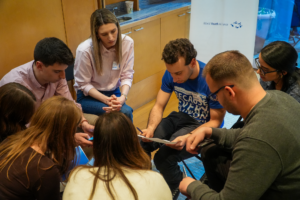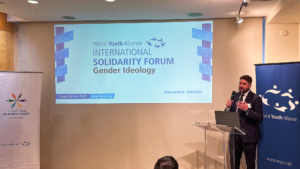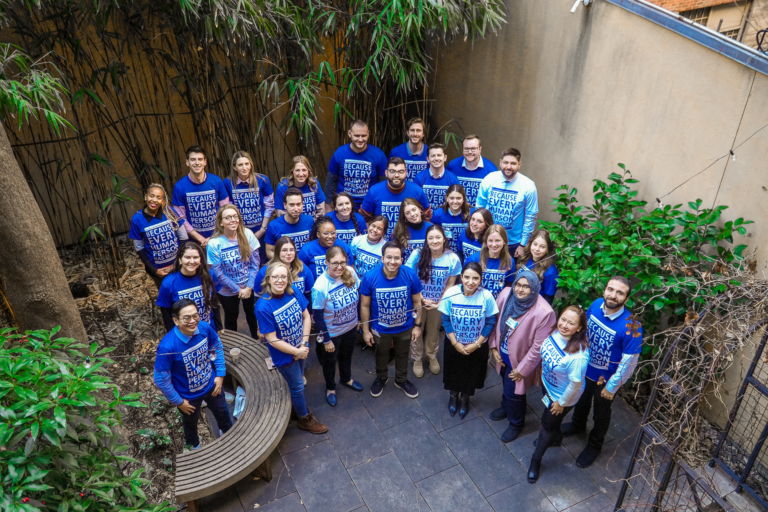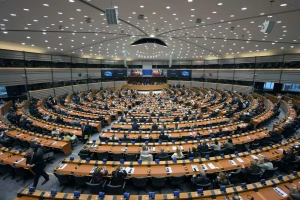“I feel. Therefore I am.”
Modern culture celebrates each person’s “right” to autonomously define their gender, apart from their sex at birth. This year’s delegates explored the many biological, scientific, philosophical, and moral problems with this view of human nature.
The 22nd ISF brought together voices from twenty different countries, including doctors, social workers, students, educators, and detransitioners. The Forum cultivated conversations amongst a diverse array of perspectives on the biological reality of sex and gender.
“I am here because I value life, and I want to bring that to my country in a way that is both based in science and truth, especially with respect to those who struggle with gender incongruence”, delegate Darion from Trinidad and Tobago said.
Keynote speaker Susanne Kummer ushered in the ISF by exclaiming that gender identity in its popularity today takes on a new adage: “I feel. Therefore I am.” Kummer, who is the Director of the Institute for Medical Anthropology and Bioethics, explained to ISF attendees that language is used by ideologies as an instrument of power.
Gender Ideology is Harming Youth and Restricting Freedom
Delegates and speakers challenged the idea that drastic medical intervention for children identifying as transgender should be the first course of action. They united over a common principle: the importance of promoting ethics in medical interventions for young children, in accordance with the United Nations Convention on the Rights of the Child. This is especially vital for those affected by the transgender movement’s encouragement of hormone therapy and invasive surgeries as a panacea.

Disturbingly, countless lawsuits, reports, and calls for clarification on these medical interventions have been ignored. Founder of LGBT Courage Coalition and whistleblower Jamie Reed explained how groups like the World Professional Association for Transgender Youth and the American Academy of Psychiatry are not being fully transparent in how they are treating transgender cases.
This is another reason the stories of those who detransition must be heard.
Birgit Kelle, a journalist and bestselling author from Germany, described how Germany’s censorship laws regulate publications that question gender ideology, while the government funds “trusted flaggers” to report social media posts that call such ideology into question. Both Reed and Kelle agreed that solutions to these issues will most likely need to be legislative.
Reed concluded with an outcry against the lack of informed consent from children and the fact that kids can access services like hormone therapy without parental permission. These mechanisms by which life-changing medical treatments can be attained are directly against the United Nations Convention on the Rights of the Child.
Detransition is on the Rise. The Truth is Coming to Light
Delegates also heard harrowing firsthand accounts of the harms of gender ideology from three patients who have detransitioned. Three detransitioners shared their stories about years of failed hormone therapies and surgeries which ended in life-threatening hospitalizations and traumatic mental states. One detransitioner, Soren Aldaco of the University of Texas at Austin, spoke about the importance of medical care that protects the patient’s human dignity. “The duty of care is different from standards of care,” she said. “The duty of care is to do no harm.”
Dr. Pilar Vigil, Research Director of the Reproductive Health Research Institute, led a workshop on the biology of human sexual development. Through a series of case studies, ISF delegates learned about the influence of hormones in developing males and females. The workshop covered disorders of sexual development, which affect brain composition and have broad effects on physiology and behavior.
Dr. Vigil spoke about how during embryonic development, hormones including testosterone, estrogen, DHT (dihydrotestosterone), progesterone, and estradiol influence brain development and sexual differentiation between male and female persons. While biological and hormonal factors can impact sexual differentiation, Dr. Pilar emphasized the fact that, as embodied persons, human beings are born as one gender or the other.
Human Dignity is the Answer to Gender Ideology
One of the most powerful takeaways of the week was the importance of acknowledging the humanity in each person—this is how we promote human dignity in the face of gender ideology.

When asked about how to approach gender ideology in pop culture, Susanne Kummer went back to the basics: “Start with loving people and respecting people.” Dr. Juan Pablo del Río, PhD, leader of the Gender Dysphoria Support Unit at the University of Chile, emphasized the importance of compassion for patients with gender confusion, remarking that “We miss the opportunity to encounter the people who suffer.”
Whether living a trans life, transitioning, or detransitioned, they are real people who must be encountered, heard, and loved.
“Every human relationship is based on trust and truth and then based in humility,” said Dr. Patrick Hunter, a pediatrician from Orlando. “The physician-patient relationship is no different. Doctors and counselors must see the good of the patient first. The patient is vulnerable and must trust the physician.”
Throughout the week, delegates participated in UN-style policy debates to write a Declaration on Gender and Human Dignity. Combining ideas and scholarship from psychology, medicine, and philosophy, the Declaration affirms WYA’s commitment to truth, human rights, and the authentic development of individuals and families and opposes any policy or initiative to impose gender ideology on children. Delegates included a provision advocating for the right of children to be protected from harm.
Our delegates worked incredibly hard learning, thinking, and articulating a positive vision of the human person. WYA is grateful to everyone who helped make this year’s event a great success, and we look forward to another fruitful ISF in 2026.




